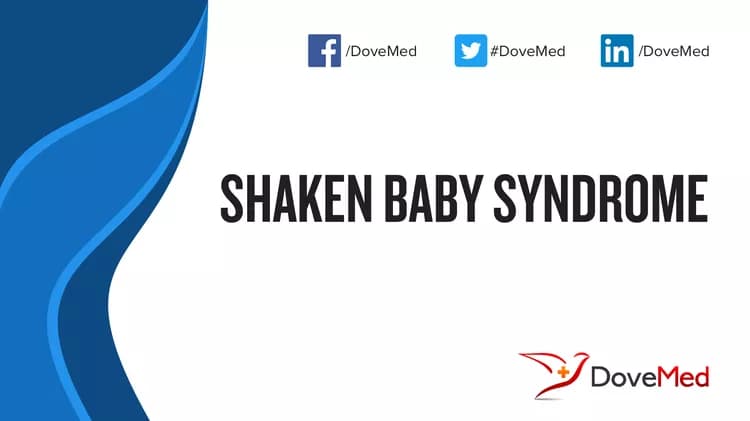What are the other Names for this Condition? (Also known as/Symptoms)
- Abusive Head Trauma
- Inflicted Head Injury
- Shaken Impact Syndrome
What is Shaken Baby Syndrome? (Definition/Background Information)
- Shaken Baby Syndrome (SBS) is a serious form of child abuse caused from a baby being shaken excessively or thrown against an object/wall, resulting in a severe brain injury. The condition is mostly described in children up to the age of three
- The primary risk factor is a negligent caregiver, who vents his/her anger and frustration on the child, often when the child is crying continuously. Shaken Baby Syndrome is often caused by a person who is well-known or related to the child, such as a parent or a babysitter
- The symptoms for Shaken Baby Syndrome include irritability, bruising, redness, seizures, and vomiting. In a vast majority of cases, the condition is severe and can result in complications such as blindness, hearing loss, and neurological damage
- Immediate intervention is needed to address Shaken Baby Syndrome, since it is a medical emergency. The prognosis for children with the condition is generally poor, because of the severity of brain damage; long-term disabilities or deaths are reported
Who gets Shaken Baby Syndrome? (Age and Sex Distribution)
- Shaken Baby Syndrome is most commonly seen in children younger than a year old
- It is normally reported in children aged three years and below; while, some cases involve children between age three and five years too
- Both males and females are known be equally affected
- The condition is noted worldwide and among all races and ethnicities
What are the Risk Factors for Shaken Baby Syndrome? (Predisposing Factors)
The risk factors associated with Shaken Baby Syndrome include:
- Caregivers, who are abusive and displace their anger, stress, and frustration towards the child
- Caregivers addicted to alcohol or illicit drugs
- Caregivers who are depressed or otherwise mentally unstable
- Caregivers with unstable family situations, including young or single parents
It is important to note that having a risk factor does not mean that one will get the condition. A risk factor increases one’s chances of getting a condition compared to an individual without the risk factors. Some risk factors are more important than others.
Also, not having a risk factor does not mean that an individual will not get the condition. It is always important to discuss the effect of risk factors with your healthcare provider.
What are the Causes of Shaken Baby Syndrome? (Etiology)
Neglect and abuse by a caregiver or parent towards the child results in Shaken Baby Syndrome. The condition leads to:
- Damage to the developing, fragile brain of a child by being shaken or thrown; the neck of a young child is generally weak compared to the size of their head
- When the head of a child is injured, it can cause extensive damage to the brain and nervous system
What are the Signs and Symptoms of Shaken Baby Syndrome?
The signs and symptoms of Shaken Baby Syndrome include:
- Physical signs that may be few and include bruising, pale skin, and lethargy
- Irritability
- Difficulty breathing, hearing, or eating
- Seizures and tremors
- Altered level of consciousness
- Paralysis
How is Shaken Baby Syndrome Diagnosed?
A diagnosis of Shaken Baby Syndrome may include:
- A complete physical exam and medical history evaluation; assessing the presenting symptoms
- Questioning the caregiver to determine how the child was injured
- X-rays to ascertain if bone fracture has occurred
- Computerized tomography (CT) scan to image the brain, in order to detect injuries
- Magnetic resonance imaging scans of the head
Many clinical conditions may have similar signs and symptoms. Your healthcare provider may perform additional tests to rule out other clinical conditions to arrive at a definitive diagnosis.
What are the possible Complications of Shaken Baby Syndrome?
The complications of Shaken Baby Syndrome may include:
- Eye damage leading to partial or full blindness
- Hearing loss
- Developmental delays, mental retardation, or cerebral palsy
- Coma
In many cases, it can result in death from injuries sustained by the child.
How is Shaken Baby Syndrome Treated?
Immediate medical attention is required for children with Shaken Baby Syndrome. The treatment may include:
- Symptomatic treatment to address the condition
- Oxygen support or surgery may be required depending on the severity of the brain damage
- Speech therapy and physical therapy; occupational therapy
How can Shaken Baby Syndrome be Prevented?
The prevention of Shaken Baby Syndrome may involve:
- Educating caregivers about the dangers of Shaken Baby Syndrome
- Seeking help with child-rearing
- Avoiding subjecting the child to excessive shaking motions and violent movements
- Keeping children away from stressful situations, such as arguments and domestic violence
- Avoiding entrusting individuals with the responsibility of childcare, particularly to those who are not trustworthy or have a suspect personality
- Immediately reporting child abuse to the police or any governmental child protection service
What is the Prognosis of Shaken Baby Syndrome? (Outcomes/Resolutions)
- The prognosis for Shaken Baby Syndrome is usually poor; in many cases, the condition results in death of the baby
- The small percentage of affected infants who do survive SBS may experience permanent damage to their brain, spine, hearing, or vision
Additional and Relevant Useful Information for Shaken Baby Syndrome:
If there is a suspicion of child abuse, call 911 or your local emergency number to immediately report the abuse.
Related Articles
Test Your Knowledge
Asked by users
Related Centers
Related Specialties
Related Physicians
Related Procedures
Related Resources
Join DoveHubs
and connect with fellow professionals


0 Comments
Please log in to post a comment.